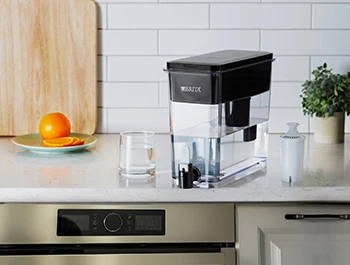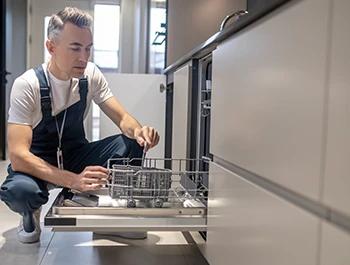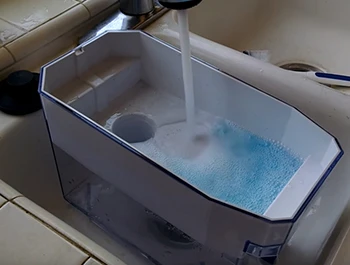Generally, a dishwasher filtration system extracts the deposits and minerals in the water that form marks on the dishes and in the dishwashers. The impacts of heated water, hot air, aggressive detergent, or churning water might scratch, dissolve, or score the material.
So, there is confusion about whether we should put Brita in our dishwasher or not. Plus, We get curious to know What Happens If You Put A Brita In The Dishwasher?
No, it’s not dishwashing safe. Though not recommended for washing machines, most of the jugs are dishwasher-safe up to 50°C. However, if you utilize the filter jug by hand with warm soapy water and a sponge, no damage will be discovered.
We are considering Brita as a safe part since they have already passed some safety standards. However, we will let you know what possibly happens with Brita along with how you should put Brita in a dishwasher.
Can I put a Brita in the Dishwasher?

It’s possible to attach Brita to your dishwasher, although it is not recommended. Hand wash dispenser or pitcher, lid, and storage daily with a light detergent, not strong cleansers, and gently rinse.
Both a Brita filter plus pitcher must be disregarded, however, the pitcher is made of high-quality plastic that should not be put in a dishwasher because the heat can compromise the plastic’s quality. Instead, it will be more precise in refrigeration.
What Happens If You Put A Brita In The Dishwasher – 7 Facts to Know

So many explanations to make Brita a friend but they have some risky moves with good vibes. Still, people ask, “Will a basic Brita pitcher leach hazardous chemicals if washed in the dishwasher? No, it isn’t. Rather, it will destroy whatever vestige filtering the poor worn old thing has within it.
- The heat utilized in the dishwashing method may cause the filtration to expand.
- Brita frequently leaves scratches, melts, and is scored by the impacts of warm air, warm air, spinning liquid, and powerful detergent.
- It might reduce the device’s capacity to effectively filter water.
- Use carbon to eliminate pollutants from pitcher or faucet filters.
- Filters are intended to be utilized on the countertop, and using them in a dishwasher may invalidate the protection.
- When it comes to filtration, fillers are either back flushed, the stream of liquid is reversed to normal flow, heat treated according to the type and what it was filtering, or chemically cleaned.
- Also, if you use a Brita pitcher, it usually improves the quality of tap water by filtering out metals and other contaminants.
Checking the manual and following the directions can help you avoid any damage with this type of filter. However, stainless steel baffle filters and mesh filters are typically dishwasher-safe.
Are Brita Pitchers Dishwasher Safe?
Brita pitchers are dishwasher safe water filter pitcher, but be careful to remove the filter, which should never be handled with soap. You won’t have to worry about the safety of the Brita jars because they are made of strong glass. However, follow the given ideas:
- You should hand-wash pitchers as well as the internals.
- Hand washing is required when algae forms between the pitcher and the lid.
- Use the top rack of the dishwasher to sanitize it. However, do not use the bottom rack because it places the pitch close to the source of heat used for drying the dishes.
- Employ the dishwasher with the pitcher anywhere it matches.
- The air drying option and avoiding using a heating source can be prioritized.
- You may have decided to use the dishwasher to clean the pitcher; consequently, without heating elements, you won’t achieve what you need.
- Also, fill the pitcher and include 3 to 4 denture cleansing tablets.
Potential Risks Of Putting Brita Filter In Dishwasher
We have mentioned earlier the negativity that spread out while you put Brita in your cabinet dishwasher. Remember, if not grounded appropriately, there is a risk of electric shock.
Also, uncleaned Brita filters generate high temperatures and aggressive detergent chemicals in a dishwasher, which eventually destroy foodstuff while also creating an environment for bacteria to develop, resulting in food poisoning. Therefore, what you should follow to overcome the problem is:
- Always unplug your Brita filter before putting it in the dishwasher.
- Never place any sharp objects near the filter.
- Thoroughly wash your Brita filter after every operation to sanitize it.
Manual Guideline For Brita Filter In The Dishwasher
The best thing to do before installing a Brita filter is to read the manual to understand the specifications. The intense temperature and aggressive chemicals used in dishwashing could harm your filter, so pick the right one after reading the manual.
Can Brita Dishwasher Filter Make You Sick?
In the European Journal of Clinical Microbiology, a 2014 research published that the level of bacteria in tap mineral water was lower than in purified water after the first week of consumption at two distinct temperatures. Employing a Brita filter to reduce the bacteria level in the water is not that successful. Additionally, a 2020 research also discovered that Brita carbon filters significantly decrease lead water contamination to an acceptable limit.
How to Clean Brita Pitcher – 10 Simple Steps

Well, if you install the Brita filter pitcher, you need to know how you should clean it to have the best result. You can simply clean the device by using a soft cloth, dish soap, and water. So, let’s have a look at the simple steps that you should follow.
Step 1
The pitcher is a BPA-free durable plastic carafe. Get dish soap and water. Remember that surface scratches can generate vulnerable spots, and there should be no requirement to wash the pitcher base so aggressively. Rather, fill the pitcher including one part vinegar and two parts water, and soak it for a while to ensure it’s ready to be washed out.
Step 2
Please make sure the vent is towards the pitcher’s back. The Refill Cover feature should be at the back.
Step 3
You should never put your Brita filter in the dishwasher.
Step 4
Set the filter on a fresh surface to keep it from polluting it. Disconnect the pitcher’s water tank and set it in the sink.
Step 6
You should clean the reservoir with a rag, a little dishwashing soap, and warm water.
Using a moist cloth, clean the interior and outside of the tank, and the base where your filter is placed.
Step 7
Because the filter layers are formed of cleaning ingredients like charcoal and coconut shells, the replacement filter must be cleaned.
Step 8
Rinsing the filter with water for Thirty seconds to a minute can clear any carbon or dirt that has gathered.
Step 9
Place the filter in the dish rack or on a towel until the unit is dry.
Step 10
Ensure it’s properly dried out to avoid smells or mildew.
Final Words
So, what happens if you put a Brita in the dishwasher? You’ll eventually damage the dishwasher’s surface, allowing bacteria to grow, increasing the risk of electric shock, and triggering other difficulties. Aside from that, Brita jugs are washer-safe at 50°C.
Additionally, whenever you think about putting a Brita in your dishwasher to keep everything clean and make sure you read the manual book about the notable facts.
Putting Brita requires proper cleaning so, just uninstall the Brita filter and follow the steps that we mentioned above. But what we suggest about the Brita is, better you avoid putting the Brita filter and go for the water filter that will ensure your dishwasher’s safety.
